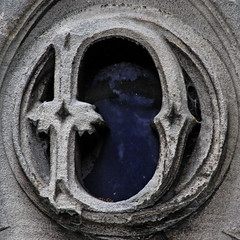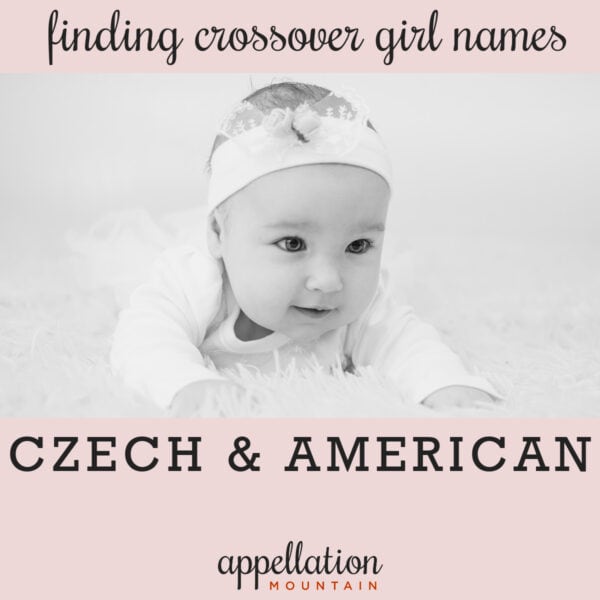File this one under obscure saints.
Thanks to Lindsay for suggesting Dymphna as our Baby Name of the Day.
Back in the 600s, Damhnait was born in Ireland, a minor princess. Mom was a Christian; Dad, not so much. When her mother passed away, legend has it, her father decided that the only possible solution was to marry his daughter. Damhnait fled, but her father tracked her down and decapitated her.
Tales of virtuous young women choosing death over dishonor aren’t uncommon; and just like many of those stories, it is tough to verify the facts. Damhnait’s ordeal was first written down in the 1300s, and doubtless some things changed over the centuries.
One of the things that changed was her name. Damhnait comes from the Gaelic damh – stag; adding the -ait ending makes it “little stag” or fawn. The name’s pronunciation is DAV nat. The village of Tydavnet, not far from her birthplace, was named in her honor.
But between the 600s and today, we came to know her as Dympna or Dymphna. It may be that there are two separate figures. Or the story of Damhnait’s flight might be accurate. Some say she made it all the way to Belgium before dad tracked her down. In Belgium, there’s a town called Geel, and one of the smaller villages that make up Geel was originally called Sint-Dimpna.
The saint’s relics remain in a church in Geel, and the tiny town became known for as a center for healing. But get this – it’s not the conventional miracle served up here. Instead, Dymphna is said to cure mental disorders and nervous conditions. For centuries, patients have come to Geel, so many that an annex was built onto the church to lodge the afflicted. But the lodge was soon bursting, and thus began a remarkably forward-thinking tradition: in Geel, patients seeking treatment live with local families. It is still considered a model program.
While there are some missing links, the end result is this: Damhnait became Latinized as Dymphna, possibly via the Dutch, and an Irish princess became the patron saint of the mentally ill. Forget the “v” sound; this name is now said DIMF nah.
Should you be near Ohio, you can visit the National Shrine of St. Dymphna, the first church in the U.S. dedicated to the saint.
There are just a few uses outside of the church:
- Australian writer Dymphna Cusack;
- Australian politician Dympna Beard;
- Anthony Burgess gave the name to a minor character in his 1962 dystopian novel The Wanting Seed.
The name has never appeared in the US Top 1000, and fewer than five were born in the US in 2009. While obscure saints’ names are popular with parents for lots of reasons, Dymphna’s sound is a little awkward. It’s no wonder she hasn’t caught on.
And yet, the more I hear Dymphna, the more I wonder if it isn’t a mistake to count her out. It’s an intriguing tale, and an interesting sound. Like any D name, the nicknames Dee and Didi are possible. For the truly daring who don’t mind wearing their faith on their sleeve, Dymphna could be an option.





Ah. I can’t get behind Dymphna. Something sounds…wrong about it. I just can’t place it! It sort of sounds like something inappropriate, or maybe a part of a plant or body part, or maybe it sounds like some foreign word? I’ve got no clue.
Here’s one I’ve heard: Myrna. [MYRRH-nuh].
I always fascinated my the legends of the martyrs, but Dymphna feels like a J. K. Rowling creation to me. Actually, I was certain there was a character named Dymphna, but I was thinking of Nymphadora.
I really shouldn’t write replies late at night. I meant…
I’m always fascinated by the legends of the martyrs,
Reminds me of Daphne as well as Dyna/Dinah. Also reminds me of Hmmph!
While on a vacation to Ireland, I met an elderly woman who told me all about her daughter who had moved to Chicago. Her daughter’s name was Dymphna. The mother seemed very proud of her daughter and made sure that I knew that she was named after a saint.
It’s an interesting name but with that back story, I just don’t think this one is for me.
Absolutely charming back story on this one *coughs violently*. I wish I could un-read it.
Not a fan but I can see how some might like the doughy sound.
Well, yes. I’m astonished at how many saints’ backstories read something like this: determined to maintain her virtue, she fled, and when her pursuer caught up with her, she died a horrible death.
Yup, although it was the possible incest angle that launched it into the WTF? category. *shakes fist at Wikipedia* It was too early in the morning to even attempt to process that kind of thing!
When I saw the title all I thought was…Say What?
It would be a great name for parents who want a legit name that is almost completely unknown.
I remember thinking that when I read “The Wanting Seed.” I had literally never heard the name before. Thought actually, Dymphna’s death in the story is actually worse than the saint’s demise, so …
Her story is fascinating, but Dymphna is way too clunky in my opinion. I say it and I think of Daphne, nymph, dumpy, and dimpy. No thanks.
She’s got a fascinating and inspiring story, but Dymphna is simply too clunky for my tastes.
I can see lots of confusing with Daphne and nymph. This doesn’t work for me at all, although I like that she’s the patroness for the mentally ill.
I find that incredibly appealing, too – though I didn’t read far enough to figure out how she ended up patroness.
St. Dymphna was a popular saint when I was a little kid. I got her card in school, but probably tossed it shortly after. 😀
Dymphna’s got a sweet, gentle sound but looks rather lumpy. I like saying Dymphna but not looking at her. As a non – Catholic, I’d probably not use Dymphna but she’d be really neat on someone else’s kid. Stellar middle material, though!
I’m even more intrigued by Damhnait – wonder if it is ever used?